Keresés: %s
Keresés: %s
The Government voted against the Brussels proposal to reduce the use of natural gas
Hungary and Poland have voted against the European Commission's new dangerous proposal to extend the previous regulation by another 15 percent cut in the use of natural gas, Minister of Foreign Affairs and Trade Péter Szijjártó said in Brussels on Tuesday.
According to a statement by the Foreign Ministry, the minister said at a press conference during the break of the EU Energy Council that instead of raising additional funds or infrastructure development, the European Commission has come up with a proposal that would again require a reduction in natural gas consumption.
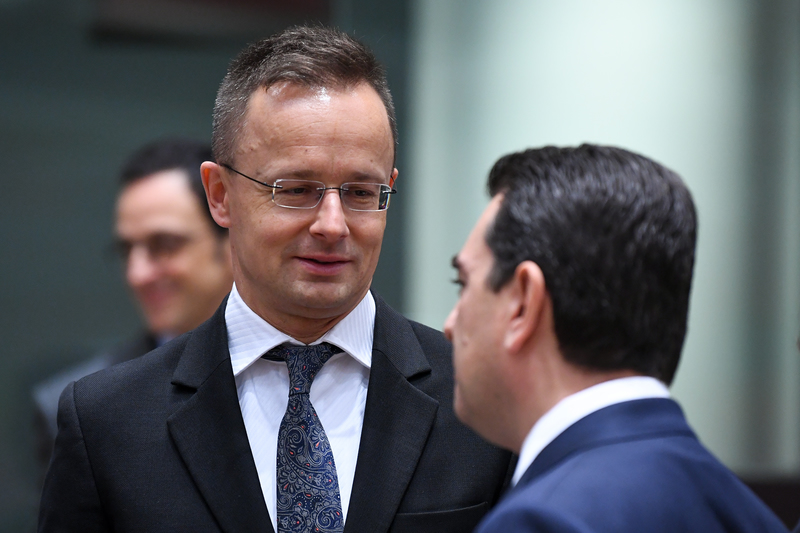
Such a regulation was already adopted last year despite Hungarian and Polish protests, but this one is even more dangerous. The previous one was for a winter period when, in addition to industrial consumption, residential consumption increases for heating, making it easier to reduce than in summer, when overall consumption is lower.
"If the use of natural gas by industry has to be artificially reduced, it means that there is a risk of a downturn in the economy," he underlined, while warning of security of supply problems.
"In addition, Brussels is once again stealthily taking powers away from Member States, as energy use, the national energy mix and the structure of the economy are explicitly national competences, and by imposing a reduction in gas use, they are effectively infringing on this sovereign right of Member States," he pointed out.
Szijjártó pointed out that after the first decision, Poland appealed to the European Court of Justice, arguing that a unanimous vote was needed to adopt the measure, and Hungary joined the case on that side.
"This time we also voted against this proposal, which unfortunately was supported by everyone except the Poles and us. So, they imposed another 15 percent gas cut as an extension of the previous regulation. This, I repeat, is extremely dangerous, unreasonable and does not solve the problem," he stressed.
He added that this new regulation could lead to a further contraction of supply in Europe, because it is a basic economic principle that if the quantity of a good decreases in a given market, its price will increase.
"This proposal brings the risk of price rises, security of supply and an economic downturn," he said.
"For all these reasons, Hungary did not vote for this proposal, and we continue to take the clear position that natural gas supply is not a political issue, that discriminating against gas sources on political grounds is extremely damaging, and that we should help to ensure that as much gas as possible comes to Europe from as many sources as possible.
The minister added that the continent has had a particularly mild winter and everyone is happy that we have survived the last few months in terms of security of supply, but many experts warn that there is no reason for extreme optimism, as there is a real risk of gas shortages this winter.
One reason is that there will be a shortfall of around 60 billion cubic metres of Russian gas from the European network this year compared to last year, and the Chinese economy is expected to reopen, leading to a significant increase in consumption, while LNG capacity has not yet been built to the extent needed to make up for the shortfall," he said.
In addition, the fact that natural gas prices in Europe are now seven times higher than in the US and electricity prices three times higher than in China due to sanctions and other "misguided measures" is a serious competitive disadvantage, he said.
"In this situation, the only sensible and effective solution is to increase the supply of gas to Europe," he concluded.
Source: MTI - Hungarian News Agency
It is a lie that the government would stop cooperating with Russia's Rosatom
It is a lie that the government would stop cooperating with Russia's Rosatom on the Paks expansion project: the increasing role of the French company Framatome concerns the supply of the control system after its German consortium partner Siemens Energy has not yet received an export licence for political reasons, Foreign Minister Péter Szijjártó said in Brussels on Tuesday.
According to a statement by the Foreign Ministry, the minister said at a press conference during a break in the EU Energy Council that there is indeed negative discrimination against nuclear energy, as shown by the fact that the Paks expansion in Europe is "constantly being hamstrung" and "attempts are being made to sanction nuclear investments, which we regularly fend off".
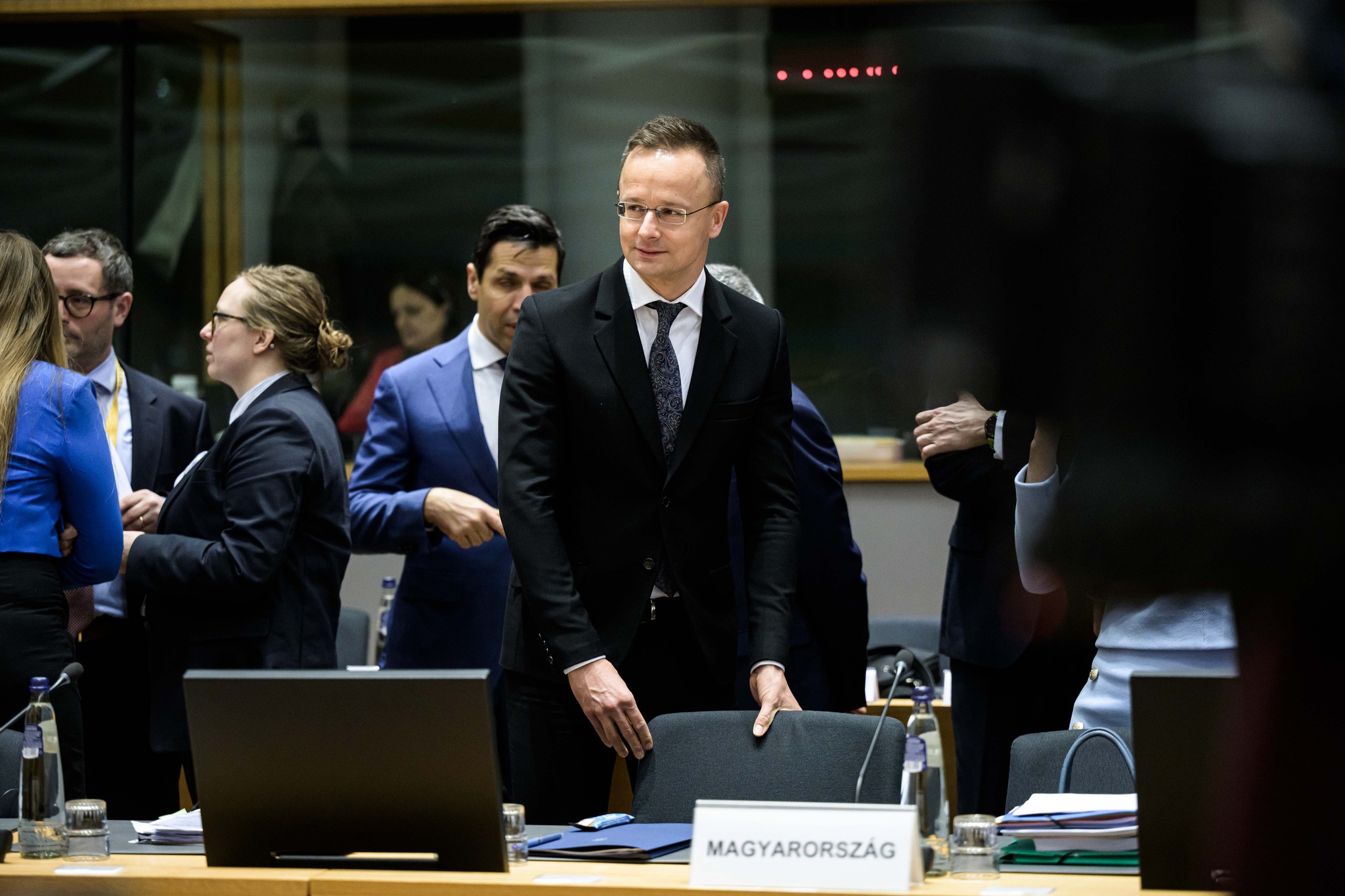
He underlined that the German government continues to block Siemens Energy's involvement and that the company has not yet been allowed to deliver the equipment ordered under the contract.
"There is a steady stream of fake news in the international liberal press. Most recently, we read that the Hungarian government would stop cooperating with Rosatom, which is a complete lie," he said.
"We are committed to the implementation of the agreement signed with Rosatom nine years ago. We are committed to the construction of Paks II with Rosatom (...) There is no reason for us to abandon this cooperation," he added.
Szijjártó stressed that when it comes to increasing the role of Framatome, it refers to the fact that, due to the politically motivated blocking of Siemens Energy's participation in Berlin, Hungary wants to rely more on the French company for the supply of the control system.
"I would like to make it clear that our experience with our cooperation with Rosatom has been positive, and we want to and will build the new Paks units with Rosatom," he said.
He also said that a nuclear coalition had been formed within the European Union, led by France and involving twelve countries, which met on Tuesday morning.
He pointed out that seven countries are planning or are already building new nuclear power plants, so that a "great nuclear renaissance" is expected in Europe in the coming years to guard against irrational and extreme price fluctuations.
The Minister underlined that the parties agreed to work closely together to counter artificial, ideologically based negative discrimination against nuclear energy, as exemplified by the fact that each nuclear licensing procedure "is extremely stretched out".
"We are therefore calling for the credit conditions to be changed so that they can be applied in a fair and equitable way to nuclear investments," he said.
"We call for a review of legal and licensing procedures, based on the experience that Europe has gained in the use of nuclear energy over decades," he said.
"And in order to have enough experts and enough capacity, we have proposed the development of common training programmes," he added.
Source: MTI - Hungarian News Agency
Hungary can maintain its ban on imports of Ukrainian agricultural products
During the negotiations with the European Commission, Hungary was able to maintain the results and measures related to the ban on imports of Ukrainian agricultural products, Minister of Agriculture István Nagy told MTI in Brussels on Wednesday.
He said that Hungary would continue to ensure the transit of Ukrainian grain and that it leaves the country under controlled conditions. The Agriculture Minister added that further talks are underway to discuss which other products could be affected by the import ban, in addition to the four basic products - wheat, maize, rapeseed and sunflower.
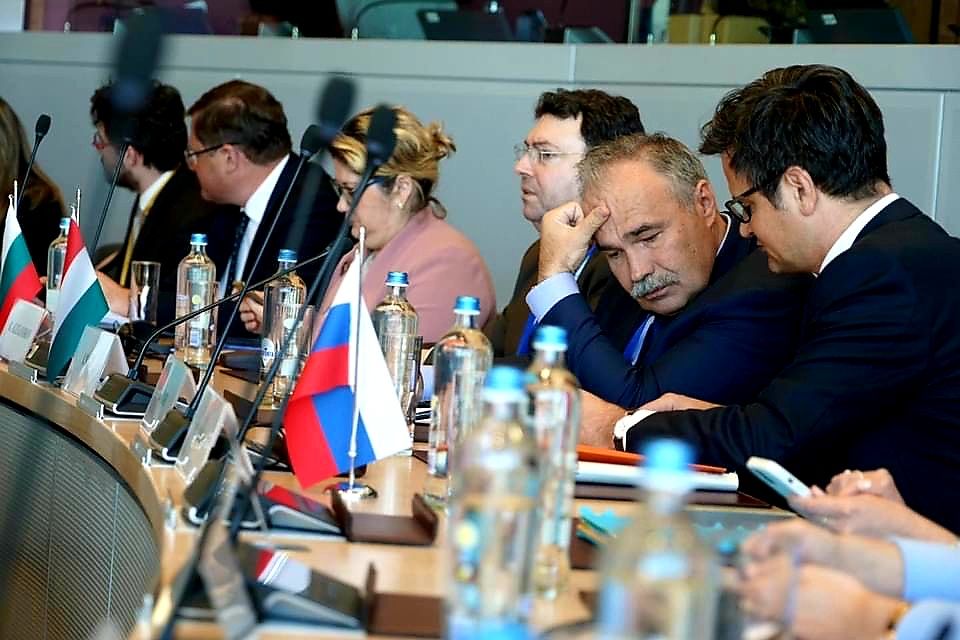
He said that the decision of the member states to act independently to prevent the import of Ukrainian agricultural products without any controls had led to results. It was worth Hungary taking a firm stand and defending the interests of Hungarian farmers, as this stand has forced the European Commission to take action.
He recalled that the leaders of five EU member states - Hungary, Poland, Slovakia, Bulgaria and Romania - had asked the European Commission to take action on the issue of Ukrainian grain entering Europe duty-free, which was causing damage to local farmers. During the negotiations in Brussels, the EU Commission made an offer that will make all the measures introduced so far legal, István Nagy said, adding that the promises include the creation of a legal framework to allow Hungary to continue to maintain an import ban on Ukrainian agricultural products while ensuring transit.
Regarding the legislative decree on trade liberalisation for Ukrainian agricultural products, which will be in force until 5 June, Hungary is asking for guarantees that the regulation can be automatically extended if necessary, he said. The EU Commission has promised to do so, he stressed.
The five countries also want to help the European Commission with proposals on how to ensure the supply of Ukrainian agricultural products through the solidarity lanes to countries that have traditionally been the destination of Ukrainian products.
On Wednesday, the European Commission announced a new aid package of €100 million to help farmers in five countries, including Hungary, who are facing difficulties because of the unlimited imports of Ukrainian grain, István Nagy said.
Source: MTI - Hungarian News Agency
War mood in the EU, majority in favour of increased arms transfers
The atmosphere in the European Union is one of war, with the overwhelming majority of member states wanting to supply Ukraine with more weapons for more money, more quickly, while pro-peace actors are under heavy attack, Foreign Minister Péter Szijjártó said in Luxembourg on Monday.
At a press conference held during the break of the EU Foreign Affairs Council, the Foreign Minister said that another Hungarian citizen had been successfully evacuated from the fighting-ravaged Sudan and that he and his spouse were safe in Ethiopia, where they were being assisted by Hungarian embassy staff.
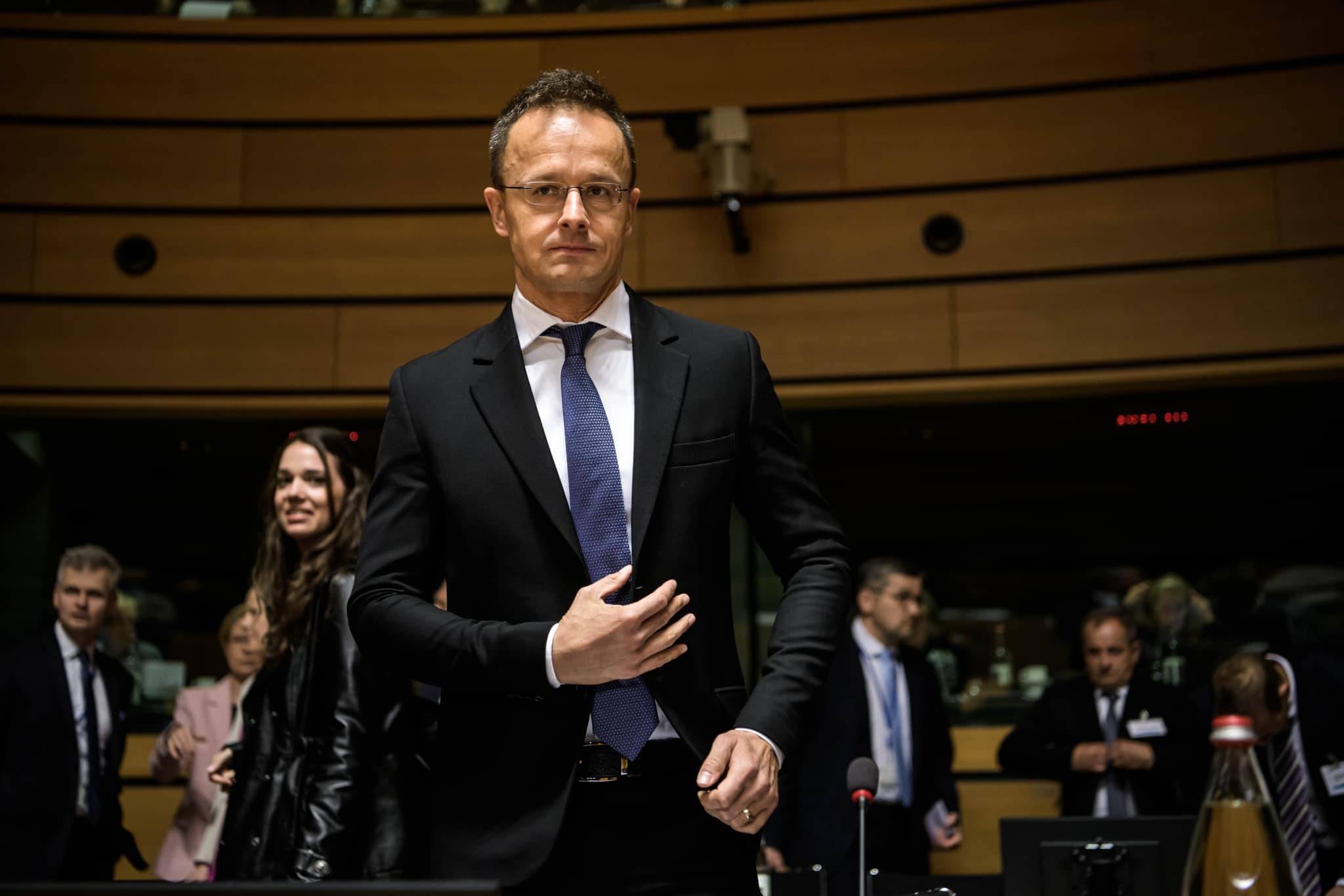
He added, however, that since the middle of last night it had not been possible to contact the five other Hungarians in Khartoum because of the breakdown of internet and telephone services, but should there be any developments, the ministry will immediately provide information.
Commenting on the Luxembourg Council meeting, he said it had again started with "self-blaming", with many believing that the EU had still not done enough to support Ukraine. "If we were to summarise what the position of the vast majority of European countries is at the moment, we could roughly say that we must supply Ukraine with more weapons, for more money, even faster," he said.
"This atmosphere of war also implies that the pro-peace advocates continue to be under severe political and verbal attack, whether from countries present or absent, which continue to argue for peace," he added.
Szijjártó also touched on the issue of Ukrainian grain exports, recalling that the government had agreed to the creation of so-called solidarity routes to alleviate the global food crisis, but the reality was different.
"The vast majority of grain and food products shipped from Ukraine stopped in Central Europe, stopped in countries neighbouring Ukraine, and it is clear that this was not what was agreed," he pointed out.
"The European Commission would have been, or should have been, obliged to correct this situation immediately and make it clear that the agreement between the European Union and Ukraine was for transit shipments," he said.
He underlined that Hungary is sticking to the original idea by making it clear that, while it will allow transit shipments, it will ban direct imports, as this will cause extreme difficulties for domestic producers, who will have to comply with much stricter EU standards.
The minister then complained that there is still a "serious determination" to impose sanctions on the Russian nuclear sector, which is already paying a heavy price for the war on energy supplies.
He cited the example of Hungary's ability to purchase oil from two directions, via Croatia and Ukraine, and the transit fees on both routes have been increased significantly, with the former charging five times the market average and the latter three times the previous cost.
"And now they want to impose a measure here that would put Hungary in a serious situation not only in terms of energy bills, not only in terms of energy prices, but also in terms of security of energy supply," he warned.
He stressed that Hungary needs 2,400 megawatts of new energy by the beginning of the next decade, which can be provided in an environmentally friendly and cheap way only by nuclear reactors.
"If the Paks II project is made impossible, it will be impossible for Hungary to produce the electricity needed to run its economy and supply its people by the beginning of the next decade," he said.
He also said that the Paks investment contract had been concluded more than nine years ago and had been approved by Brussels.
Finally, he stressed that Hungary would not agree to any nuclear sanctions, even on a small scale, in order to protect its key national interests, as this would create a situation which he said would be exploited by some. In this context, he referred to the "phenomenon of over-fulfilment" and pointed out that, although there are no sanctions on nuclear in place, the German government will not allow Siemens Energy to deliver the Paks control technology.
Source: MTI - Hungarian News Agency
Hungary will be able to maintain its ban on grain imports from Ukraine
Although no decision was taken at the EU Agriculture Council meeting on how to avert the internal market crisis caused by Ukrainian grain in the European Union, the upcoming agreement will mean that Hungary will be able to maintain its ban on grain imports from Ukraine, Agriculture Minister István Nagy told Hungarian journalists in Luxembourg on Tuesday.
During a break in the meeting of the European Union's Agriculture and Fisheries Council, the minister said that the negotiations were on the right track, as the European Union had accepted the coercive measures taken by Member States to ban imports of Ukrainian agricultural measures by unilateral decision.
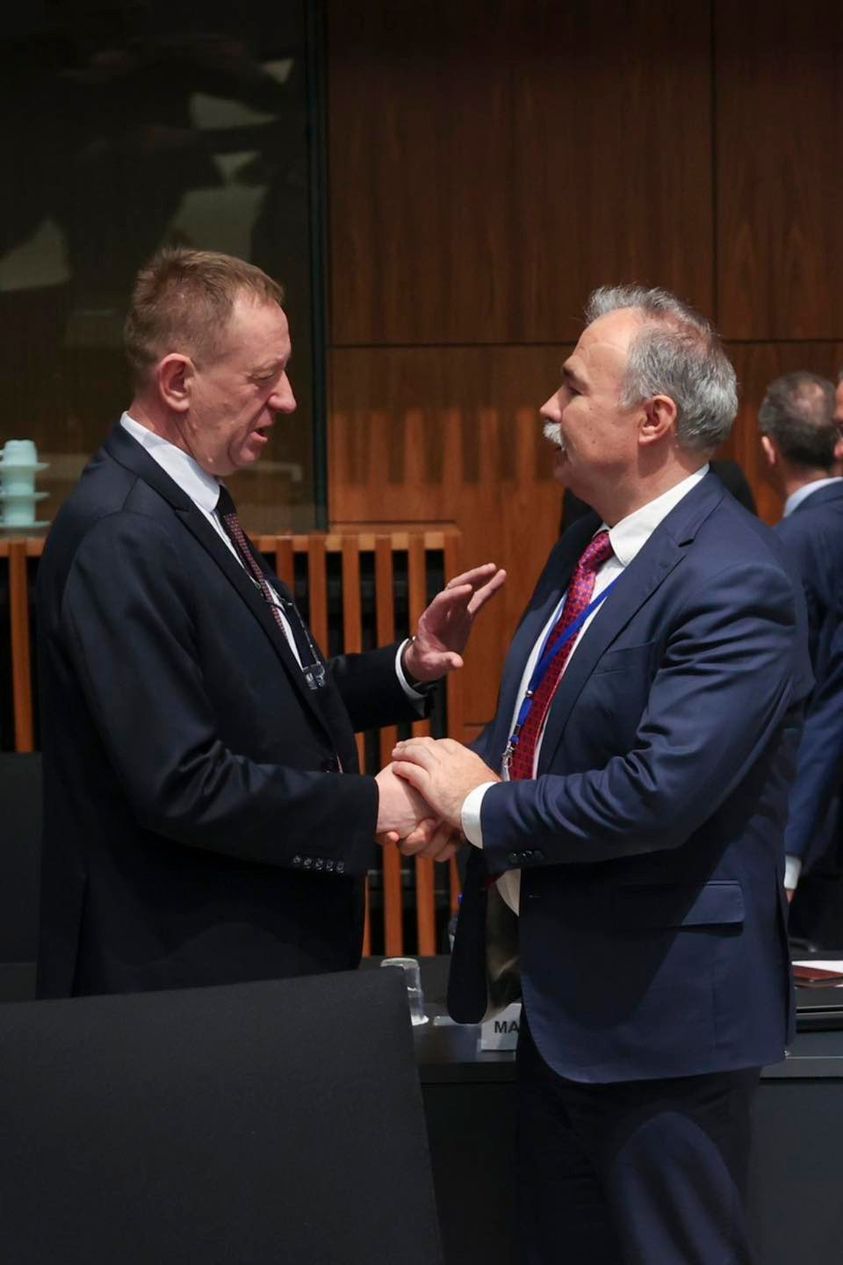
The EU recognised the gravity of the situation, understood the decision of the Member States and was looking for solutions to allow the measures to be maintained. The outcome of the forthcoming agreement will be that Hungary will be able to maintain its ban on grain imports from Ukraine, said István Nagy.
Last week, the leaders of five EU Member States - Hungary, Poland, Slovakia, Bulgaria and Romania - asked the European Commission to take action on the issue of Ukrainian grain entering Europe duty-free, which causes damages for local farmers. Hungary, Poland, Slovakia and Bulgaria had previously imposed unilateral import bans on Ukrainian agricultural products.
The minister said that further negotiations were needed on the five products recommended by the EU - wheat, rapeseed, maize, sunflower and sunflower oil - and on which other products the import ban should be covered by.
He also said Hungary wanted guarantees that the ban could remain in place until the end of December. As for the EU setting up a €100 million fund to help affected farmers, István Nagy said that discussions on how to increase the amount were also under way. He said that a solution would also have to be found to ensure that Ukrainian cereals could reach traditional markets and countries in need.
Only when the traditional routes for Ukrainian grain are available again will the internal trade chain be restored and the market be able to function, he stressed. To this end, Hungary proposed that the European Union should support transit transport, he said.
Hungary will continue to negotiate until a satisfactory solution is found that guarantees the safety of Hungarian farmers and that they are compensated for the damage they have suffered, István Nagy added.
Source: MTI - Hungarian News Agency
Ukrainian grain was in the focus at the Agriculture and Fisheries Council in April
Ministers of agriculture exchanged views among others on the market situation, thus the problems with increasing agricultural imports from Ukraine and the implementation of the new CAP Strategic Plans in their meeting held on 25th of April in Luxembourg.
Minister István Nagy specifically drew attention again to the difficulties related to the increasing agricultural imports from Ukraine. Recalled, that after the outbreak of the war of aggression, it was a common commitment to ensure global food security and establish alternative logistic routes using all relevant routes and so that Ukrainian grain could be transported by land. To this end, the European Union set up the Solidarity Lanes. To the well-functioning of the Solidarity Lanes Hungary is very committed and actively involved. Despite to the aim to ensure grain supply to countries outside Europe, unfortunately a significant part of the incoming crops is sold on the markets of countries bordering with the Ukraine, leading to serious market disruptions. The frontline countries have called the Commission for immediate action to solve the problem.
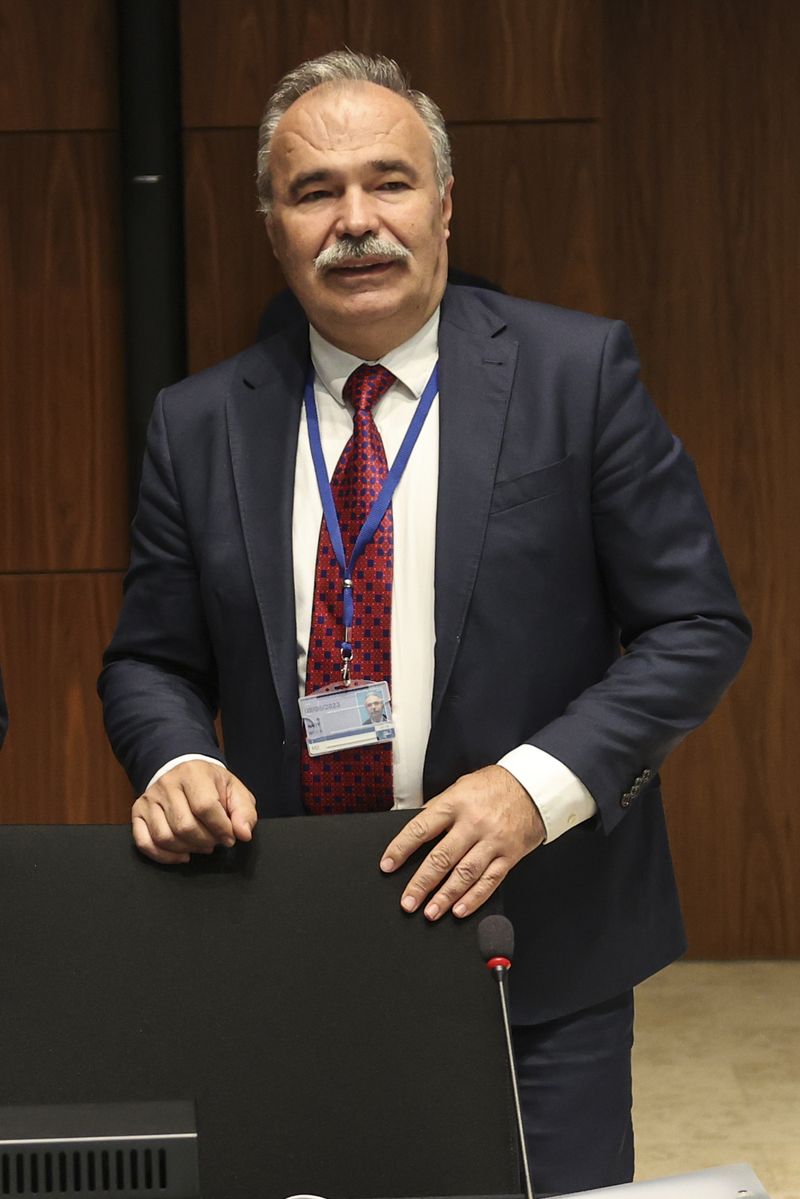
Regarding the implementation of CAP strategic plans, Member States outlined that they have faced several challenges, such as approving national implementing legislation, developing IT system or providing information to farmers and stakeholders. Member States highlighted that the late approval of the new CAP legislation and the long approval process of the strategic plans very narrow time frame was available for the preparation necessary to launch the new programme. Minister István Nagy among several Member States asked the European Commission to show flexibility during the modification of the CAP strategic plans and react quickly to Member States’ queries to ensure a smooth implementation. Many Member States criticized that simplification was not achieved during the CAP reform and the administrative burden increased both for the farmers and the authorities.
Further topics were also discussed such as agri and forestry aspects of the carbon removal certificate system, the opportunity of bioeconomy and the strengthening of origin labelling and traceability of honey products.
The world is facing a triple, energy, food security and economic crisis because of the war in Ukraine
The world is facing a triple crisis - energy, food security and economic crisis - as a result of the war in Ukraine, which is only exacerbated by the measures taken by Brussels, and the only solution is peace, Minister of Foreign Affairs and Trade Péter Szijjártó said in Brussels on Thursday.
At a press conference following the EU Council meeting on development issues, the minister said that the whole world is paying the price of the war in Ukraine, and the effects of the energy, food security and economic crises are worsening, at least two of which are affecting 94 countries, according to the UN.

He pointed out that although the energy prices have stabilised but at much higher levels than before, while rising inflation and interest rates have deprived many countries, including our own, of significant growth potential.
He also spoke of the food crisis, which he said posed a serious security risk, as it was hitting the most vulnerable countries in Africa and the Middle East hardest, potentially leading to violence, a rise in the threat of terrorism and ultimately a new wave of immigration.
Europe would not be able to cope with another massive wave of migration in its current state, he warned.
"The fact is that the response to this triple crisis has been seriously flawed in Brussels. Seriously flawed responses from Brussels that will add to the cost of war in Europe," he said.
Commenting on these "self-defeating measures", Szijjártó said that instead of restrictions, energy supplies to Europe should have been increased; moreover, Brussels was not helping but hindering Member States in producing the necessary energy themselves, for example by putting pressure on them to impose nuclear sanctions.
"Here and now I would like to reiterate that this will certainly not happen. So Hungary will not agree to any kind of nuclear sanctions, even minimal, however small," he said.
On the economic front, he stressed that the United States had taken patriotic measures, while the European Union had only imposed additional sanctions.
"The US measure is good for all US economic operators and the Brussels measure is bad for all European economic operators, it has practically knocked out the competitiveness of the European economy", he said.
On the food crisis, he recalled the objective of Europe's contribution to critical exports of agricultural products from Ukraine to Africa and the Middle East.
"What happened in contrast? After we opened the so-called solidarity corridors, Ukrainian agricultural products arrived in Central Europe and stayed there. What happened was that instead of supplying food to Africa, they destroyed Central European producers," he pointed out.
"In this situation, it is and it should have been the duty of Brussels, the duty of the European Commission, to take immediate action once it had detected this situation," he said.
"So it has been proven in practice that Brussels cannot be relied upon on such critical issues. What we do not take care of is not taken care of. If we don't protect Hungarian farmers, nobody will protect them instead of us," he added.
The minister said that a solution was being discussed and that the government would only approve a decision that would ensure "watertightly" that Ukrainian agricultural products could not be exported to Central Europe as a final destination.
He called Ukrainian grain dumping unacceptable, as farmers in Ukraine are subject to very different rules from those in the EU, which would create competition under completely different conditions, which is not fair.
"The only solution to all this set of incredible challenges is peace. If we could bring the war to an end, if we could bring about a ceasefire, if we could bring about peace negotiations, then we would have a realistic hope of managing this triple crisis successfully," he concluded.
"As long as the war is going on, the price that the world, including Hungary, has to pay is increasing day by day, and I repeat that this is not our war and we have no responsibility whatsoever for the outbreak of this war", he said.
Source: MTI - Hungarian News Agency
EYCS Council of 15-16 May 2023
The Council adopted conclusions on the social dimension of a sustainable Europe for youth, as well as resolutions on the outcomes of the 9th cycle of the EU Youth Dialogue (EUYD) and the revision of the EU Youth Strategy work plan for 2022-2024.Youth ministers held a meaningful policy debate regarding the social inclusion of young people in Europe with a special focus on young Ukrainians. Ministers argued to bear in mind and address the heterogeneity of ‘young people’ as a group when formulating policies that affect them. They highlighted many of the challenges facing young people today and discussed ways to help them overcome these obstacles, in line with the recommendations emerging from the EU Youth Dialogue, while also stressing the importance of EU programmes such as Erasmus+ and the European Solidarity Corps. They also shared the measures that are already been taken in their countries to support young people, including young Ukrainians who are temporarily displaced.
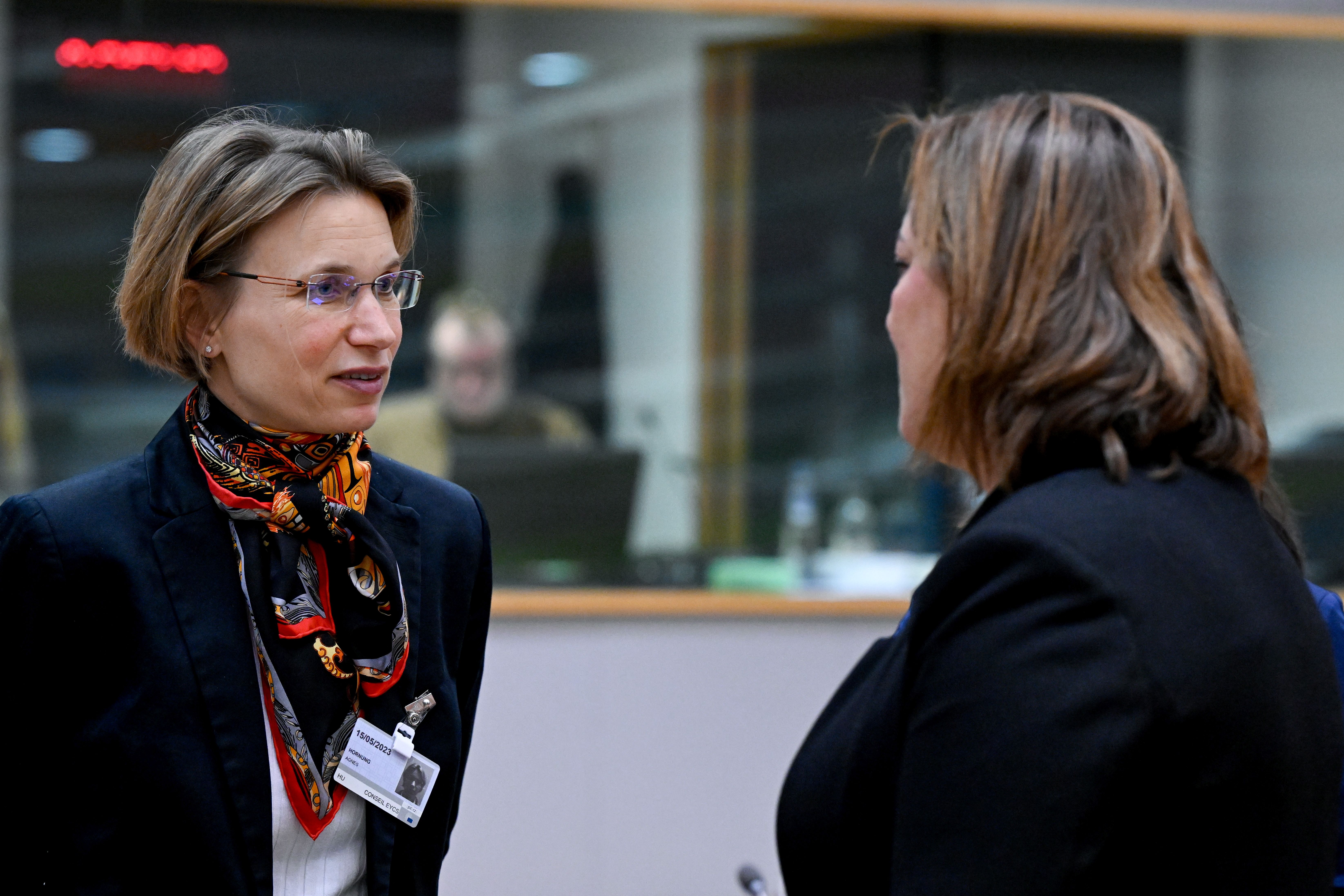
Sports ministers discussed the need to ensure respect for human rights in the organisation of major international sports events, while stressing the need for good governance in sport and strengthening transparency and respect for human rights throughout the whole lifecycle of the organisation of major international sports events. They underlined the importance of representing core human values: integrity, mutual respect, fight against disrcimination and a sense of community and fair play. Ministers agreed on continuing to fight against corruption, illegal doping, ‘sportswashing’ or violations of human rights. The Council also approved a resolution on the representation of EU Member States in the World Anti-Doping Agency (WADA).
With regard to cultural and audiovisual issues, Ministers adopted conclusions on at-risk and displaced artists. The Swedish presidency presented its progress report on the draft European Media Freedom Act (EMFA) and outlined the state of play of the negotiations on the legislative proposal, as well as the main amendments proposed on the basis of concerns expressed by member states in the work so far. The member states then exchanged views on which parts of the proposal they considered most important for strengthening the media sector and on the remaining key issues that need to be clarified before the proposal can be adopted. The majority of ministers stressed the importance and urgency of the issue and considered that a general approach should be reached during the Swedish presidency.
Number of ministers stressed the importance of the issue and called for a swift adopting of the general approach while it was also agreed that there are still open issues, including the independence of the European Board for Media Services, the protection of journalistic sources, public service media and the rights of media service providers vis-à-vis very large online platforms, which need careful consideration.
Education ministers held a policy debate about the importance of reading, the latter’s significance in equity and active participation in society.
The AoB points on the agenda of the education session included several information points, including the European Authors’ Day, the education reforms in Croatia.
Despite the pressure, we will not give up our commitment to peace and our national interests
There is enormous pressure concerning the arms deliveries to Ukraine and new sanctions, but the government will not give up its commitment to peace and its national interests, Minister of Foreign Affairs and Trade Péter Szijjártó said in Brussels on Monday.
According to a statement by the Foreign Ministry, the minister said at a press conference during a break in the EU Foreign Affairs Council that the mood remains combative, with the majority of Member States believing, contrary to the Hungarian government, that there can be a military solution to the war, while this would risk prolonging the fights.
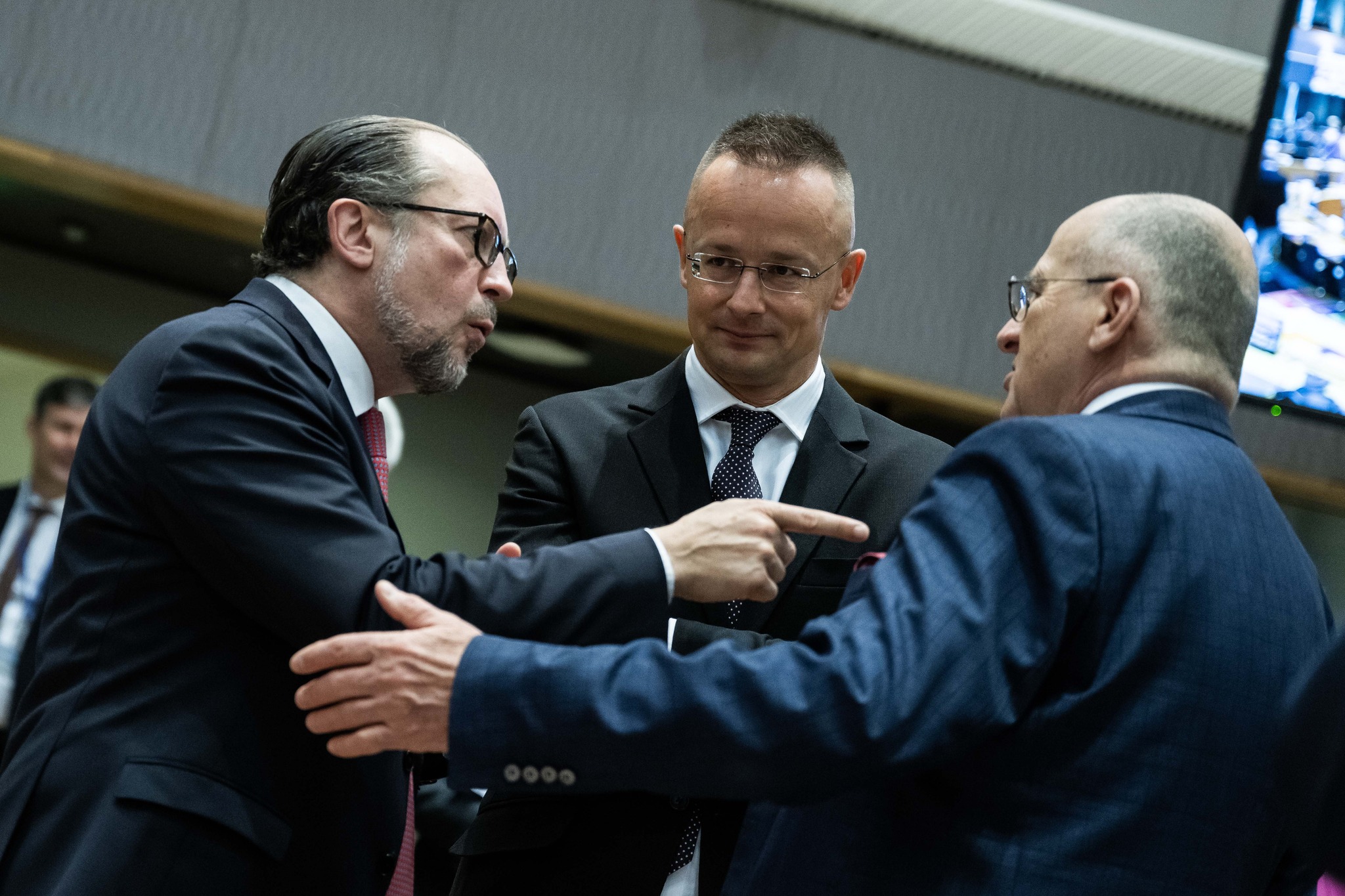
"The view that Ukraine is fighting for Europe or on behalf of Europe is still widespread. We believe that this is not our war, that we bear no responsibility for its outbreak, but that we are paying the price of this war (...) We continue to call for an end to the war and for peace talks to begin," he said.
He underlined that there is also enormous pressure for the next tranche of €500 million of the European Peace Facility to be approved and for the eleventh package of sanctions against Russia to be approved.
"Despite the pressure, we will not give up our commitment to peace, we will not give up the protection of the Hungarian community in Transcarpathia, we will not give up the representation of the national interest," he warned.
Szijjártó pointed out that 5.7 billion euros from the European Peace Facility had already been used to finance arms transfers to Ukraine, and although Hungary believes that this poses an escalation threat, the government has not so far prevented the payments, but this time it made it clear that it would oppose the new tranche until Ukraine removes OTP Bank, which does not violate any international law, from the list of international sponsors of the war.
"The accusations against OTP are false, they are not based on any facts and we demand that the Ukrainians remove OTP from the list of international sponsors of the war," he said.
He then turned to the draft new sanctions package, saying that lessons should be learned from the failed punitive measures adopted so far, as they hurt Europe more than Russia, and that new restrictions would cause even more difficulties.
He highlighted two dangerous elements, one being that they would make it even more difficult for European companies to export outside Russia, leading to a loss of competitiveness. "And, in the same way, we consider it dangerous, unreasonable and contrary to the European interest that the European Union wants to introduce restrictive measures against eight Chinese companies in this package of sanctions," he pointed out.
In this context, he explained that the sanctions against Chinese companies would have a serious impact on relations. "And with sanctions we have already shot ourselves in the foot and the lungs. If the European Union destroys its own economic cooperation with China, it will be an enormous loss", he said.
"We think that if Europe gets into a conflict with China, that if Europe wants to compete with China, Europe will lose out," he said, noting that instead cooperation based on mutual respect and mutual benefits is needed.
The minister stressed that several member states have again called for sanctions against the nuclear industry, but the government is resisting despite all pressure to guarantee energy security.
Speaking about the deprivation of the Hungarian community’s rights in Transcarpathia, he stressed that Hungary can only contribute to the progress of Ukraine's accession negotiations if Kiev restores the rights previously enjoyed by the national community.
He also said that he had heard back from a participant that the Ukrainian leadership claimed that the Venice Commission had already approved the minority law, while the body had not yet adopted its position on the matter, which could take place in June.
Although, as he said, "Ukrainian propaganda is working over the minority law", the reality will "kick the door down on everyone" in a few months' time, when the Hungarian minority schools will be unable to operate in their current form from 1 September.
"There is a lot of pressure, both in terms of financing arms transfers and sanctions, but the Hungarian government will not give up its commitment to peace, will not give up representing the Hungarian national community beyond the border, including the Hungarian national community in Transcarpathia, and will not give up representing national interests", he concluded.
Source: MTI - Hungarian News Agency
Left-wing majority in the European Parliament does not like Hungary's pro-peace stance
The European Parliament wants to prevent Hungary from holding the EU Council presidency in the second half of 2024 because the left-wing majority of the institution does not like Hungary's pro-peace stance, Justice Minister Judit Varga said in Brussels on Tuesday.
Speaking to Hungarian journalists ahead of a meeting of European affairs ministers from Member States, Judit Varga said the EP's initiative showed the institution's frustration, as one of the priorities of the Hungarian presidency will be to monitor the rule of law and the rule of law principles in the work of the EU institutions.
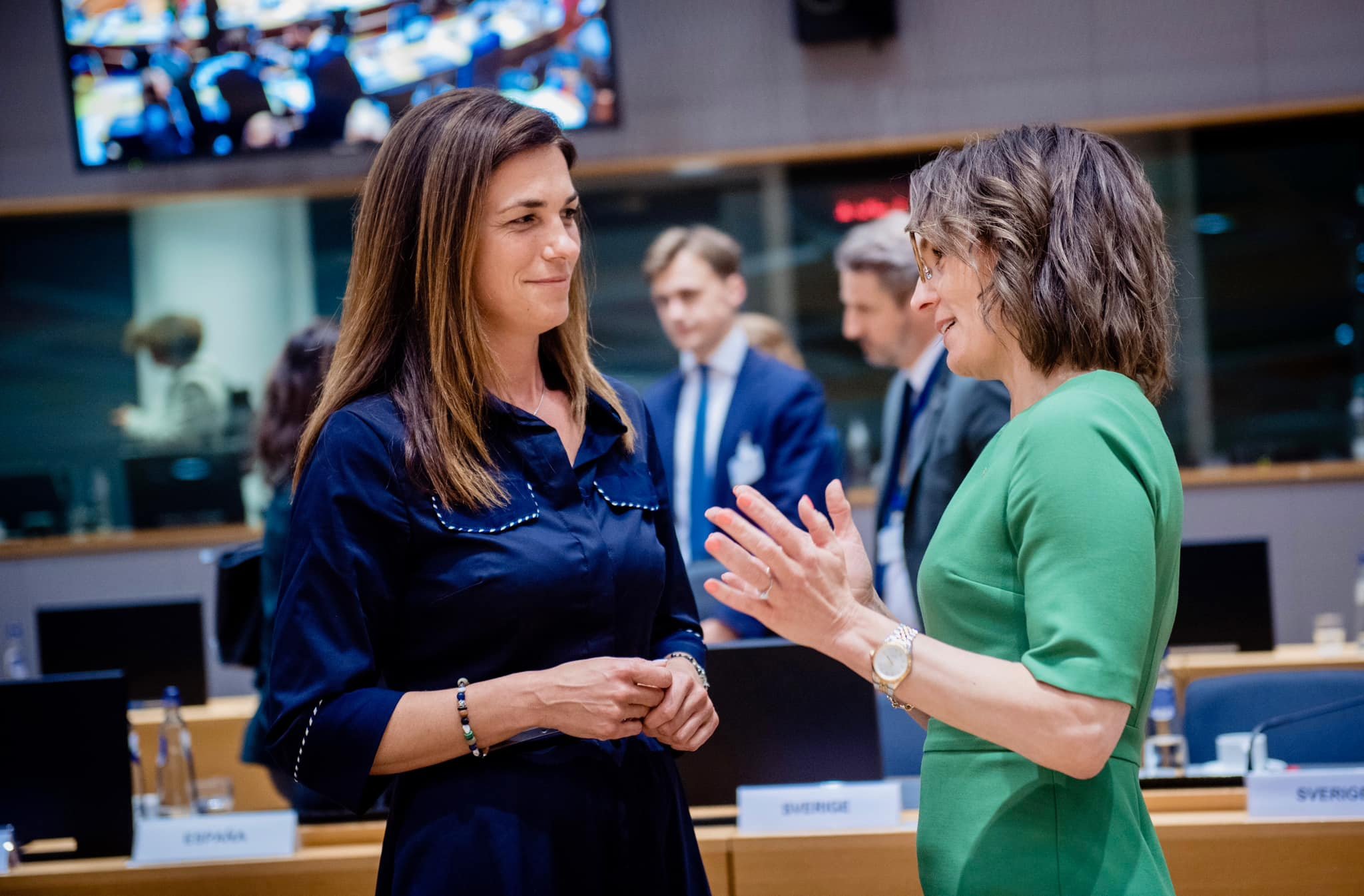
Hungary wants to check, among other things, whether the European Parliament, which "swims in corruption scandals", is abiding by its own rules and EU legal principles. It also wants to check whether the European Parliament is serving the interests of European democracy and European citizens or rather its own power interests, the justice minister said.
"The European Parliament does not respect democracy or the rule of law, as it wants to take an initiative this week that is clearly against the EU Treaties," she said.
Judit Varga called Tuesday's hearing of the EU Council's case against Hungary under Article 7 of the EU Treaties to monitor compliance with the rule of law "a sick and tired procedure".
She said it was clear that the procedure, which was launched five years ago at the initiative of the EP, was still a case of political pressure.
"Before, the problem was our anti-migration position, after the protection of families, and now, the left-wing majority in the European Parliament does not like the pro-peace position of the Hungarian government, supported by the Hungarian people," she said.
She pointed out that the Article 7 procedure had no connection with the EU Council presidency. The presidency is a duty and an honour, not a right that can be taken away from a country, she said.
The EU Parliament "has no role to play" concerning the question of who holds the rotating presidency of the Council of the Union, she underlined.
The European Parliament should be treated in its place. The EP always wants to be part of the problem rather than part of the solution. Instead of addressing the needs of their own electorate, some European politicians attack the democratically elected government and voters of a country. This is why it is most important that European citizens learn their lessons and have their say in the European Parliament elections due early next summer," added Judit Varga.
Source: MTI - Hungarian News Agency
Current agri market disturbances were in the focus at the Agriculture and Fisheries Council in May
Ministers of agriculture exchanged views among others on the market disturbances, thus the problems with increasing agricultural imports from Ukraine on 30th of May in Brussels.
State Secretary Zsolt Feldman specifically drew attention again to the difficulties related to the increasing agricultural imports from Ukraine.
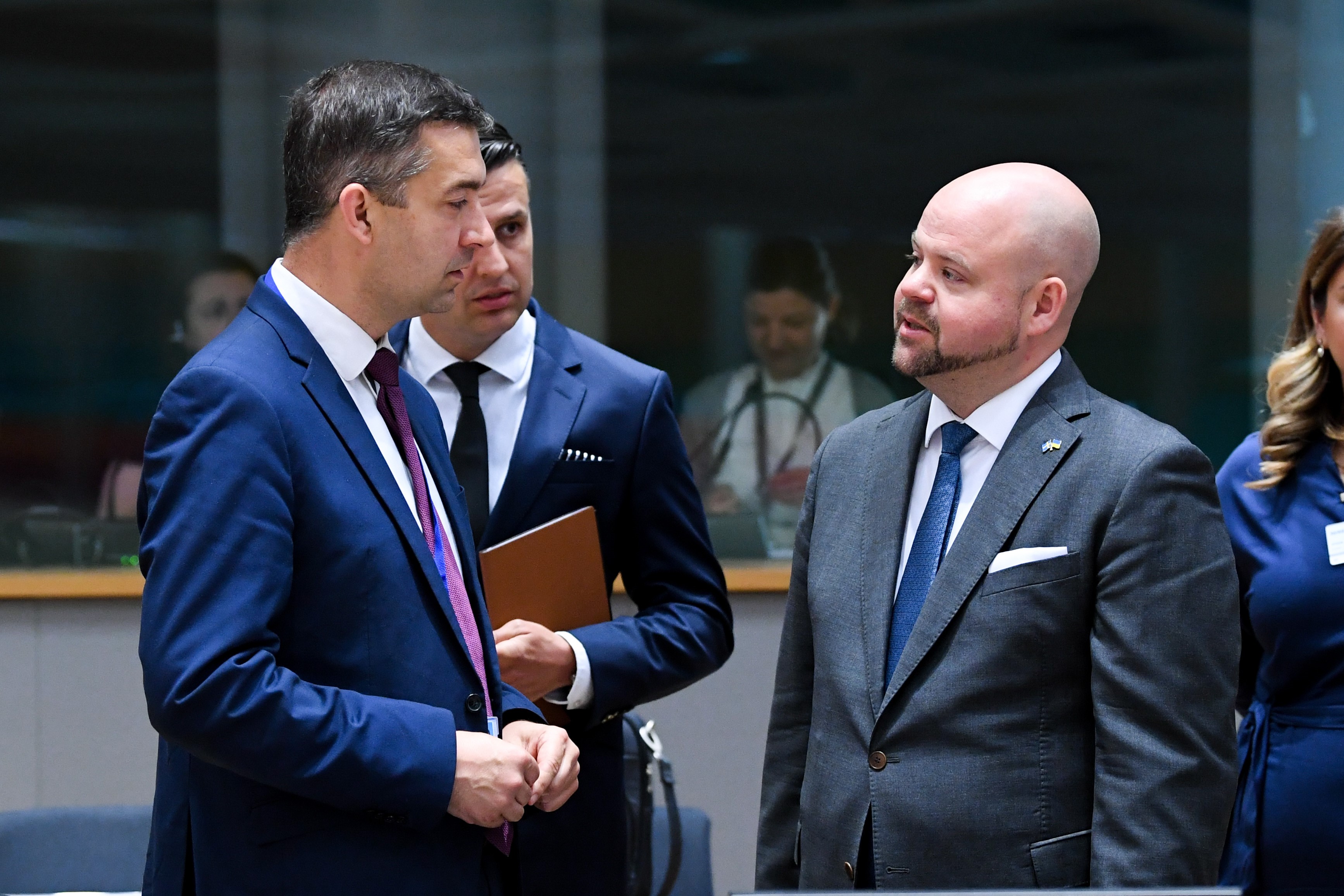
Recalled, that after the outbreak of the war of aggression, it was a common commitment to ensure global food security and establish alternative logistic routes using all relevant routes and so that Ukrainian grain could be transported by land.
To this end, the European Union set up the Solidarity Lanes. Hungary is very committed to the well-functioning of the Solidarity Lanes and actively involved.
Despite to the aim to ensure grain supply to countries outside Europe, unfortunately a significant part of the incoming crops is sold on the markets of countries bordering with the Ukraine, leading to serious market disruptions.
Therefore, the financial and other consequences need to be jointly owned and shared. The frontline countries have called the Commission for immediate action to solve the problem, asking financial support to effected farmers.
Hungary suggested progressive transport cost support to restore the original goal of the Solidarity Lanes. Several Member States also reported various market disturbances, hence the Commission has shown openness to using the remaining part of the agricultural reserve.
Further topics were also discussed such as food safety and waste aspects of the Packaging and Packaging Waste Regulation , revision of crisis management tools.
EU to introduce mandatory distribution of migrants between Member States
The European Union would introduce the mandatory distribution of migrants among Member States, and if the relevant legislative process goes through, Member States will have no say in who will live in their territories, Bence Rétvári, Parliamentary State Secretary of the Ministry of Interior, said in a statement to MTI in Luxembourg on Thursday.
The state secretary made the statement after EU interior ministers adopted a Council position on the EU's asylum reform by a majority decision.
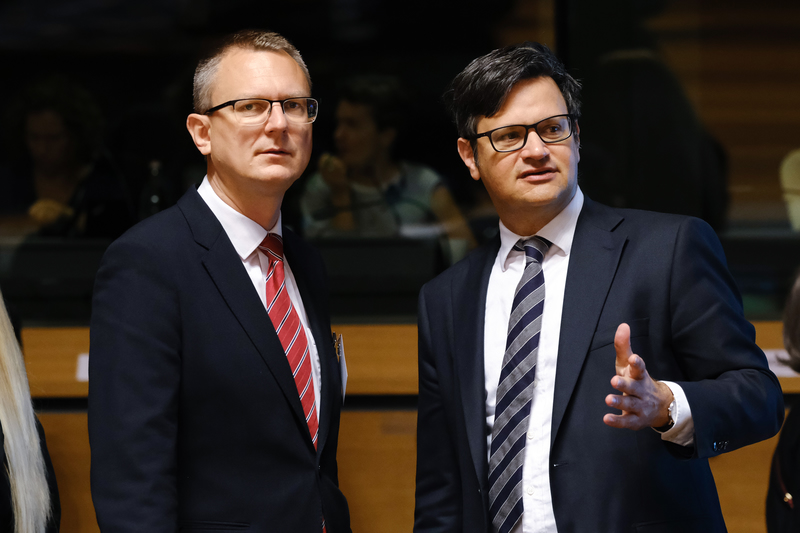
The document adopted, which contains a general approach, foresees that "through an EU distribution mechanism, it will essentially be the illegal migrants themselves or the smugglers who transport them to Europe who will decide on who will live in Europe".
He stressed that Hungary has opposed this proposal all along, together with Poland.
He added that part of the proposal is that if a Member State does not accept migrants, it will have to pay the European Union a sum of around 8 million forints per migrant.
The state secretary said it was disproportionate that the position sets out the proportion of the burden borne by each Member State for border protection or border procedures.
"Although Hungary is not a frontline country according to European decisions, the burden has nevertheless been placed on Hungary, with 28.3 percent of all border procedures being carried out by Hungarian authorities. Hungary has to provide almost one third of the total border management capacity in the European Union, and this is because the Hungarian authorities keep precise records of how many illegal migrants are returned," he said.
Bence Rétvári said he could not report any progress on EU funding for border protection costs, while Hungary had spent more than €1.5 billion on building up this capacity.
"We have repeatedly asked the EU to contribute to the costs of external border protection. If we are talking about solidarity, it does not only mean distributing migrants among themselves, but also those who are trying to distribute as few people as possible”, he stressed.
The state secretary said that the proposal was dangerous because it contained facilitations and leniencies, and that this would certainly encourage illegal migration.
He also said that the procedural process of adopting the Council's position adopted on Thursday was "a prime example of double standards and a mockery of European values".
According to Hungary's position, the European Council, which brings together the leaders of the EU Member States, has the right to decide on asylum reforms, but the Council of Interior Ministers ignored this.
He added that on Thursday, ministers voted on proposals that had been circulated a few minutes, or at most half an hour, earlier in the council meeting, and that "pro-migration governments" had put pressure on other Member States to accept the proposal.
"Hungary is constantly being questioned on the rule of law, while at the Council meeting we saw unimaginable procedural processes being used to decide on migration issues that will determine future generations," said Bence Rétvári.
Source: MTI - Hungarian News Agency
Ministerial exchange on the pharmaceutical package at the health EPSCO Council
The EPSCO Council of health ministers took place on 13 June 2023 in Luxembourg. On behalf of Hungary, Péter Takács secretary of state of health attended the meeting.
Péter Takács expressed, that Hungary welcomes the long-awaited EU Pharmaceutical Package, which we expect to contribute to making the pharmaceutical market more balanced. We need a new approach that allows us to choose the medicines that can be financed from our health budget more efficiently.
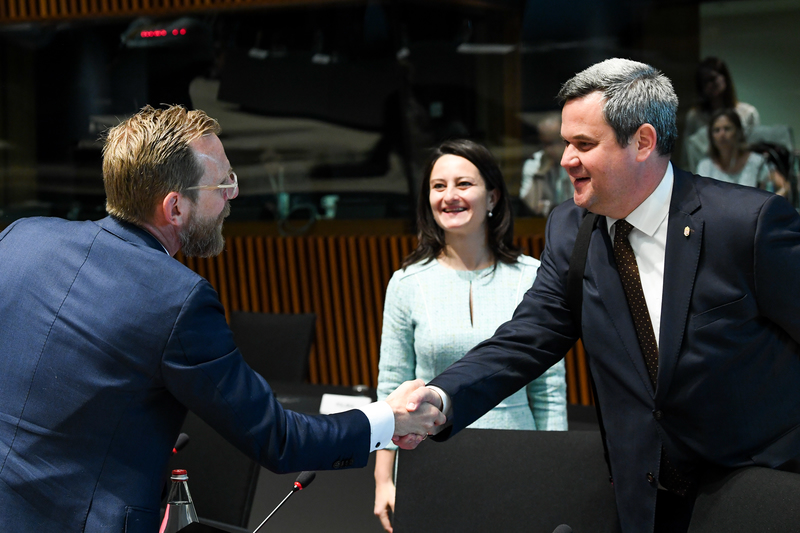
We need affordable medicines, and this is unfeasible without the timely introduction of generics and biosimilar products. In addition, appropriate emphasis must be placed on innovation, as well as on related activities, such as clinical trials. In our opinion, the drug package contains good suggestions on shortage prevention and management, but a safe supply of drugs cannot exist without strong European manufacturing capacities. That is why we expect further actions from the Commission in this area. Hungary also wants to take an active part in strengthening the active ingredient production. At the meeting, several member states underlined the importance of ensuring that the Commission's proposal does not jeopardise the competitiveness of the EU pharmaceutical industry, and several expressed concerns about a possible deterioration of the investment climate. Other member states, however, welcomed the fact that incentives to support innovation would be more conditional, facilitating more sustainable financing of the supply chain.
The EPSCO Council adopted recommendation on antimicrobial resistance, approved progress reports related to regulations on European Health Data Space and substances of human origin as well as the general approach on EMA fees regulation.
At the margin of the EPSCO Council, Péter Takács had bilateral exchange with Hristo Hinkov Bulgarian, Vlastimil Válek Czech, Orazio Schillaci Italian health ministers and Alexandru Florin Rogobete Romanian health state secretary.
EPSCO Council - Employment, Social Policy session, Luxembourg, 12 June 2023
The European Semester was once again at the very heart of policy debates within the EPSCO Council. The Ministers discussed the Spring Package and the future of the Social Convergence Framework, where a number of Member States, including Hungary voiced their concerns.
The Council reached a general approach about the proposal for a directive on improving working conditions in platform work, and gave mandate to the Council’s Presidency to enter into the interinstitutional negotiations. The general approach required delicate compromise from a number of Member States, some of them in a statement expressed their disappointment by the rules they do not perceive prescriptive enough, while other emphasised their more lenient interpretation of the text.
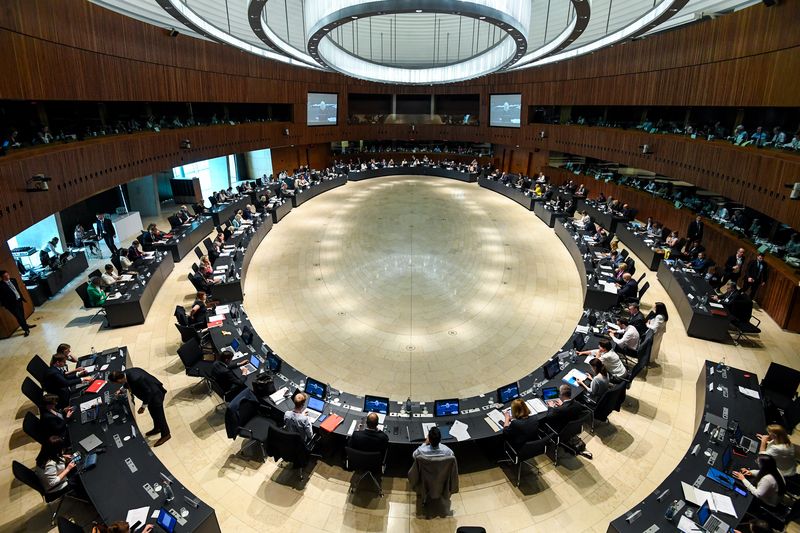
The Council has agreed on a general approach on two draft directives aimed at strengthening the functioning of equality bodies in the EU, establishing EU-wide minimum requirements in a number of key areas, including enhanced competences to combat discrimination, strengthened independence and resources. Hungary supported the agreement on both draft directives.
After taking note of the progress report on the draft equal treatment directive, the ministers held a policy debate on the possible steps forward to unblock the negotiations on the proposed directive. Hungary underlined the importance of strengthening the common EU anti-discrimination legislation framework, but also emphasised the need to continue the work to find a balanced compromise acceptable for all Member States.
The Ministers unanimously supported – therefore gave a strong mandate to the Council’s rotating Presidency to commence the interinstitutional negotiation – the general approach on a directive regarding the limit values for lead and its inorganic compounds and diisocyanates, which aims to positively affect the health of over a 100,000 workers in Europe. The Member States also unanimously adopted a council recommendation on strengthening social dialogue in the European Union.
The Council approved conclusions on mainstreaming a gender equality perspective in policies, programmes, and budgets with special focus on the Recovery and Resilience Framework.
Amongst the AoB items, Ministers have been informed by the Presidency about the interinstitutional negotiations on the amendment of the social security coordination regulations and on the protection of workers from the risks related to exposure to asbestos at work.
Hungary rejects the European Commission's right to interfere in Member States' budgets
The Hungarian government rejects the idea that the European Commission should be allowed to intervene even more strongly in the budgets of Member States, as this would constitute a new double standard, the Hungarian Finance Minister said in Luxembourg on Friday.
Mihály Varga, speaking to Hungarian journalists ahead of a meeting of the Council of Finance Ministers (Ecofin) of EU member states, said the European Commission would put Member States' budgetary policies under closer surveillance, meaning it would want to have a stronger say in the economic policies of individual Member States.
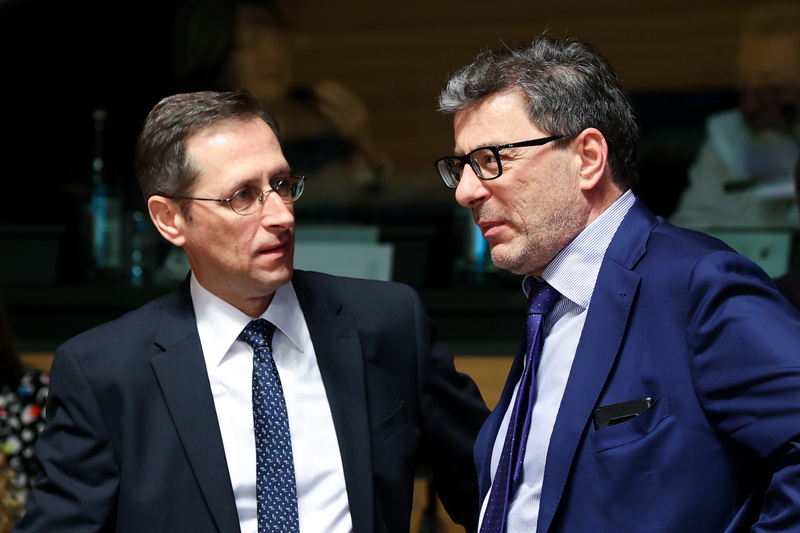
He stressed that Hungary agrees that Member States need a more disciplined fiscal policy after the outbreak of the coronavirus pandemic and the Russian-Ukrainian war, but considers it extremely dangerous that the EU Commission, by applying double standards and taking decisions tailored to Member States, takes budgetary policy out of the hands of them.
"In terms of how we develop a more disciplined fiscal policy, I don't think that the Commission should be given excessive powers and competences. This should remain a matter for national governments to decide on the right economic policies that are most beneficial for their countries," he said.
He said the Hungarian government had already started to do this, reducing public debt and deficits since the pandemic. In the 2024 budget, the deficit is already projected to be below 3 percent, at 2.94 percent, and public debt will continue to fall, as it did last year.
"Hungary will improve its public debt level to 66.7 percent next year, 10 percent better than the EU average, after this year, while the funds due to Hungary are still being withheld by Brussels. So Hungary is setting a good example and making good decisions in this respect," he said.
Commenting on the country-specific recommendations to be presented later in the day, Mihály Varga said that Hungary has verifiably fulfilled the EU commitments required to draw down EU funds, but the European Commission is coming up with more and more objections to keep on withholding the aid it is rightly entitled to.
"We feel that on the basis of the document, the European Commission continues to prepare how not to give the funds due to Hungary. This is unacceptable," he said.
He noted that if these funds had already arrived in the Hungarian budget, Hungary's economic growth last year would have been in the range of over 5 percent, not 4.6 percent.
"Hungary has implemented a number of reforms to access EU funds, so we are counting on the full amount in the 2024 budget," he said.
The finance minister concluded by summing up that there are two important documents on the agenda of Friday's council meeting, where the EU Commission is preparing to extend its powers and to intervene stealthily in the economic policies of Member States. The Hungarian government cannot accept them, and will continue to refuse to allow the Brussels body to use any means to jeopardise the results, including the establishment of a system of utility cost protection, that Hungary has achieved in recent years, Mihály Varga added.
Source: MTI - Hungarian News Agency
Hungary votes no to EU initiative attacking cuts in utility bills
Hungary will vote no to the European Commission's proposal on the reform of the electricity market, which would take away the right of member states' governments to keep electricity prices low, Minister of Foreign Affairs and Trade Péter Szijjártó said in Luxembourg on Monday.
According to a statement by the Foreign Ministry, the minister underlined at a press conference during a break in the EU energy council that the situation on the continent's energy market remains extremely fragile due to the war in Ukraine and the sanctions response, with gas prices rising again, well above the historical average, even though they are well below last year's peak.
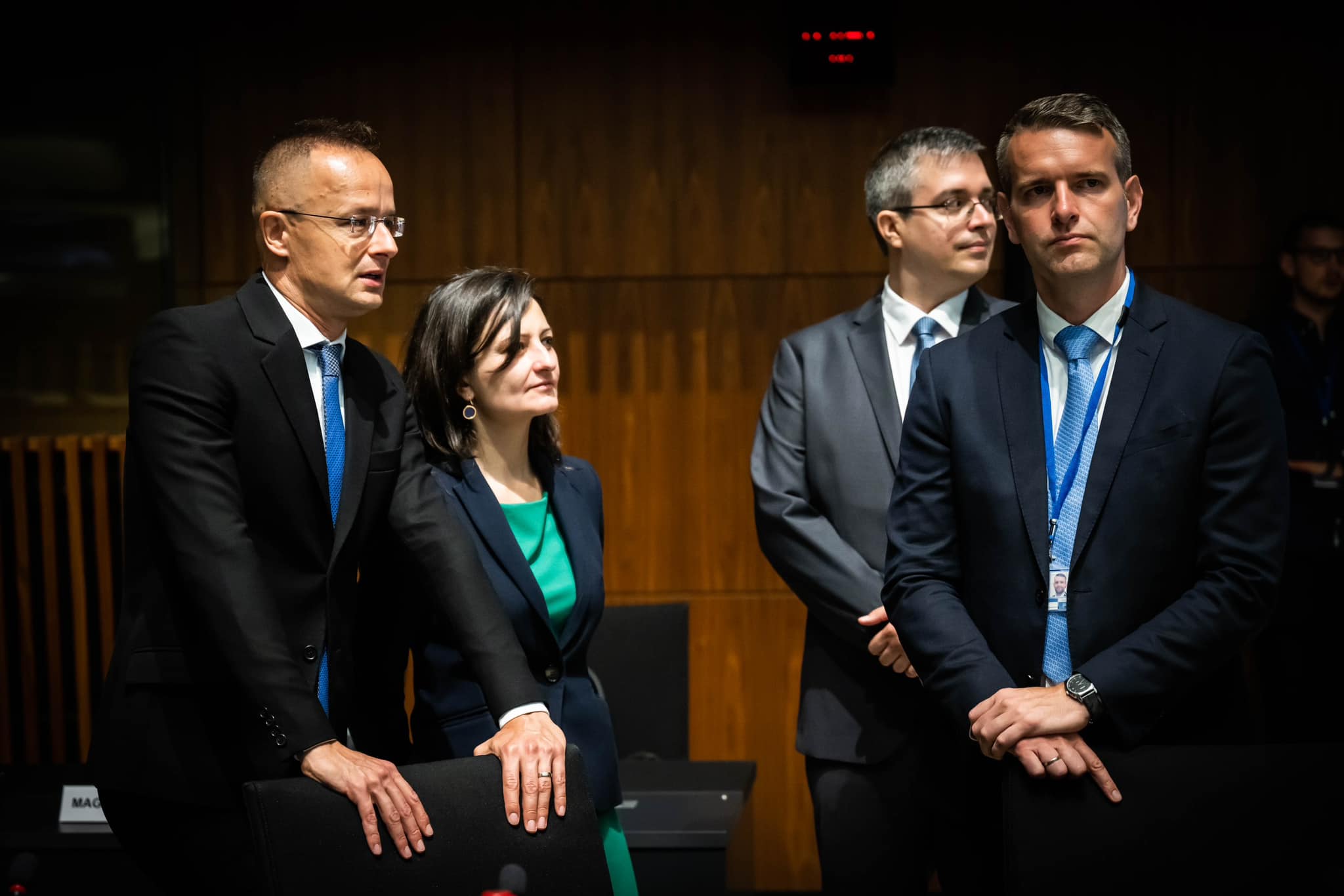
Capacity to receive liquified natural gas (LNG) is not being built fast enough, while demand has been boosted by the lifting of restrictions in East Asia due to the coronavirus epidemic, and weather is a major uncertainty, not only for next winter but also for the water use needed this summer, he said.
"In this situation, the Hungarian government has a dual purpose and responsibility. Firstly, we have to ensure the stability of Hungary's energy supply, and secondly, we have to ensure that the results of the cuts in the energy bill are protected," he said.
"Unfortunately, recently there has been a serious attack from Brussels on the Hungarian cuts, and today we are faced with the legislative proposal of the Brussels attack on the Hungarian cuts," he added, referring to the debate on the electricity market reform, which has just started.
He explained that the European Commission's proposal would take away the right of member states to protect their citizens from high energy prices, and that Brussels wants to take the right to decide when there is an energy crisis and whether to allow a state to introduce a price cut. In his words, "this would be an extremely serious step backwards from the current situation".
"This is nonsense, because one of the main lessons of the last period was precisely that member states, countries, can help by being aware of the situation and reacting quickly," he said.
"Member states' own decisions can be the solution to the difficulties. Not the extremely long, extremely cumbersome, extremely bureaucratic procedures in Brussels," he said.
Szijjártó recalled that Hungary has previously won a case in the European Court of Justice on this issue, which shows that the Brussels body has no right to take away this national competence.
"We Hungarians insist on this national competence, we insist on deciding for ourselves when to apply reduced overheads," he said.
"The Hungarian people pay the lowest overheads in Europe. And we want to maintain this situation and we will maintain it," he warned. "For us, it is completely unacceptable that Brussels should take away this right, so we will of course vote against the draft electricity market reform," he added.
The minister also referred to the confrontation over nuclear energy, pointing out that the attacks had not gone away, but that a fairly strong nuclear coalition had been formed under the leadership of France, with Hungary among the participants.
"Without nuclear energy, there is no security of supply in Europe, without it, it is absolutely impossible to achieve our environmental objectives," he said, underlining that the German government had again come forward with an initiative to impose sanctions on Russia's Rosatom.
He stressed that half of Hungary's electricity consumption is supplied by the Paks power plant, so if this proposal is formally tabled, the government will oppose it in the strongest terms. "As I have just spoken to several colleagues, it is clear that we are absolutely not alone in this," he said.
He stressed that the German argument was that sanctions against the Russian nuclear industry would help Ukraine. "Of course we respect the interests of Ukraine, but we think that in a decision of the European Union, the interests of the EU member states should weigh much more heavily than the interests of non-EU countries," he said.
Finally, Szijjártó also spoke about preparations for the next heating period, underlining that Hungary is better off than the European average in this respect, with natural gas storage facilities in Hungary already covering 39 percent of annual consumption, compared to 22 percent on the continent.
He said it was important to protect critical energy infrastructure, as it was "nonsense" that a few months ago there was a terrorist attack on the Nord Stream pipeline and "so far, everyone is spectacularly and conspicuously avoiding investigating this", and therefore Turkish Stream needed reinforced protection.
He stressed the need to improve the transport routes in South-East Europe, which would be essential for diversification. "As this is a physical issue, not a political dream, the European Commission has a responsibility here too," he said.
He also called on Brussels to take action against the "seemingly rather coordinated, absolutely unfair increase in transit tariffs" by some EU member states and third countries.
"This is not a friendly gesture, it is not a fair gesture, it is not a gesture of cooperation based on mutual respect," he said.
Source: MTI - Hungarian News Agency
Energy council on the 19th June
The energy council on the 19th June reached an agreement on the regulation which aims to reinforce the protection against market manipulation on the wholesale energy market but ministers couldn’t reach consensus on the new electricity market design proposal.
Hungary couldn’t support the proposal for the directive as it doesn’t allow for Member States to protect consumers from high the electricity prices by applying below cost energy price regulation if necessary in order to keep energy prices affordable for households and for SMEs in case of energy crisis on national level.
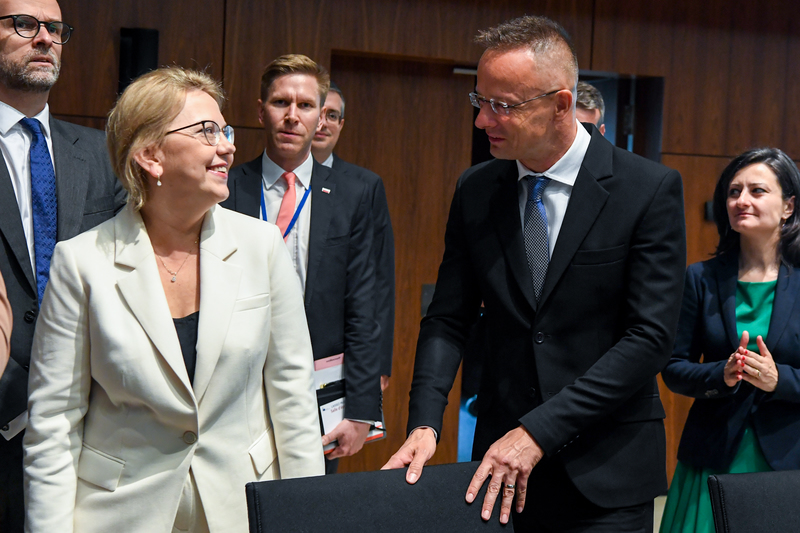
The council also discussed issues relating to launching of the second power unit of the Belarusian nuclear power plant and the construction and operation of the Akkuyu Nuclear Power Plant in the southern coast of Türkiye. The Commission then gave a presentation of the recent developments in the field of external energy and the winter preparedness for the 2023/2024 heating season.
On behalf of Hungary, Minister Péter Szijjártó reminded that the purpose of the reform should be to shield consumers, to protect the interests of each and every consumer in Europe. Therefore, the right to declare an energy crisis should be kept within the competence of the member states, since in a crisis situation, the member states can act much faster and more efficiently, as shows last years’ experiences. The minister also agreed with the request of Lithuania and Cyprus for more transparency regarding the construction and operation of the Belarussian and the Akkuyu nuclear power plants. Finally he highlighted the importance of the so called Solidarity Ring project in the allowing gas from Azerbaijan to reach Central Europe and urged the Commission for assistance in making the project a reality.
Environment Council of 20 June
The Environment Council took place in Luxembourg on 20 June. Hungary was represented at the meeting by Dr. Anikó Raisz Secretary of State for Environment and Circular Economy.
The highlight of the agenda was the nature restoration regulation. Ministers agreed – with the support of Hungary - on the Council's common position so inter-institutional negotiations can start with the Parliament in order to adopt the final text. The overall objective of the regulation is to restore all ecosystems in need of restoration by 2050. It also sets out sub-targets for example to promote more sustainable agriculture and forest management and increase urban green spaces.

Ministers, furthermore, had an exchange of views on the targets and flexibilities of the proposal on CO2 standards for heavy duty vehicles. Member States views are yet differ in tems of the acceptability of the proposed targets. Dr. Anikó Raisz highlighted, that despite Hungary remains committed to climate neutrality, we need balanced targets. She raised concerns about the 100% zero emission target set for new city buses from 2030 due to its impacts on society and small towns.
Member states hold a political debate on the review of the ambient air quality directive. The directive aims to reduce the negative health and environmental impacts of air pollution by aligning air quality standards with WHO recommendations. Ministers discussed the level of ambition of the proposal as well as the means to achieve this objective.
During lunch, ministers discussed about the preparation and Union priorities in light of the 28th Conference of the Parties of the UNFCCC (COP28).
Among any other business the incoming Spanish Presidency presented its work program in the field of environment and climate.
The Government still does not approve the financing of new arms shipments to Ukraine
Hungary will not approve the disbursement of the next European Peace Facility tranche of EUR 500 million to finance new arms shipments to Ukraine until Kiev removes OTP Bank, which does not violate international law in any way, from the list of international sponsors of the war, Minister of Foreign Affairs and Trade Péter Szijjártó said in Luxembourg on Monday.
According to a statement by the Foreign Ministry, the minister said at a press conference during a break in the EU Foreign Affairs Council that Member States had agreed to increase the European Peace Facility's resources by €3.5 billion, but that the Hungarian government had given its consent only after receiving a legal guarantee to preserve the "global scope" of the fund.
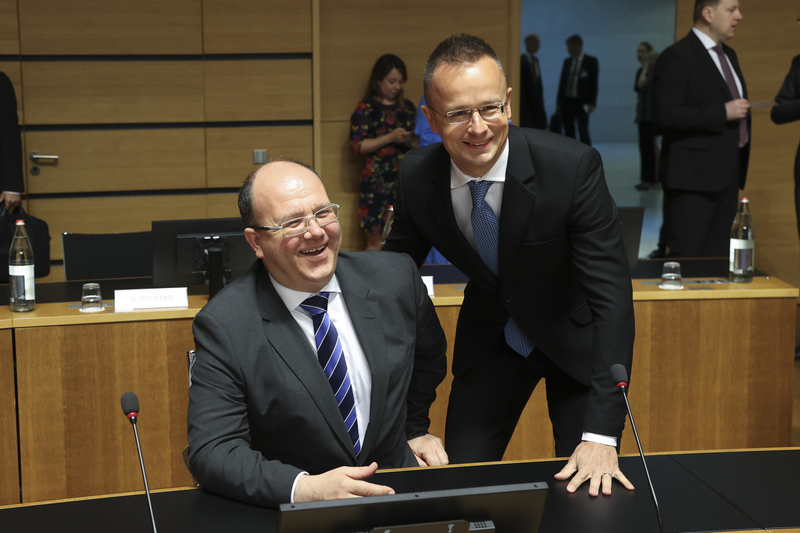
This means that the Western Balkan and African countries will also benefit from this increased amount, in order to maintain stability in these regions and thus prevent new waves of migration that pose a security threat.
In this context, he pointed out that the European Peace Facility was running out of money, as some six billion euros had already been used by Member States to partially finance arms transfers to Ukraine, and Hungary is strongly opposed to this shift in focus, as the original purpose of the instrument was to support the maintenance of stability in many parts of the world, thus mitigating security threats to the continent.
"So the European Union originally intended to provide support in Africa and the Sahel, for example, or even in the Western Balkans, to ensure peace, calm and security there, so that we could hold back the migration flows from there," he said.
Szijjártó stressed that there was enormous pressure, with almost all participants pressing for the payment of the additional €500 million tranche for arms supplies to Ukraine, but Hungary did not approve it.
"So we have still not contributed to the European Union financing new arms shipments to Ukraine from the increased amount of the European Peace Facility, since we made it clear earlier that we are only willing to lift our blockade if the Ukrainian authorities put an end to the ridiculous situation full of lies that led to OTP, the largest Hungarian bank, being put on the list of international sponsors of the war", he warned.
"This is our clear expectation, we are not willing to give in to it, but it is nonsense that while Ukraine expects the European Union, including Hungary, to make further and further financial sacrifices to finance the arms supply, it puts the largest Hungarian bank on the list of war sponsors and keeps it there", he underlined.
"I have made it clear to the High Representative and to all the ministers of the Member States in Luxembourg today that they should also take steps towards the Ukrainians", he said. "If it is so important to them to pay this additional €500 million for arms supplies, they should at least do enough to make the Ukrainians take OTP off this list," he added.
The minister stressed that the Ukrainian authorities "could easily overcome this situation, they could take the OTP off this list in a minute if they wanted to, but it seems that the will is not there at the moment".
Finally, he pointed out that the Ukrainian authorities had put OTP on the list on the basis of four grounds, all of which were "ridiculous, false and without any element of truth".
Source: MTI - Hungarian News Agency
Addressing migration challenges will be an important element of the EU Presidency Trio programme
Addressing migration challenges, combating trafficking in human beings, security policy, demographic issues and strengthening the fight against anti-Semitism will be important elements of the programme of the EU Presidency Trio - Spain, Belgium and Hungary - which will start in July, the Hungarian Justice Minister said in Luxembourg on Tuesday.
Arriving at a meeting of EU ministers responsible for EU affairs, Judit Varga said that the months of work that preceded the preparation of the programme had resulted in three very different countries putting on the table a very good work plan, which is important for Europe's global competitiveness and security policy, and which is able to meet new challenges in an era of crises.
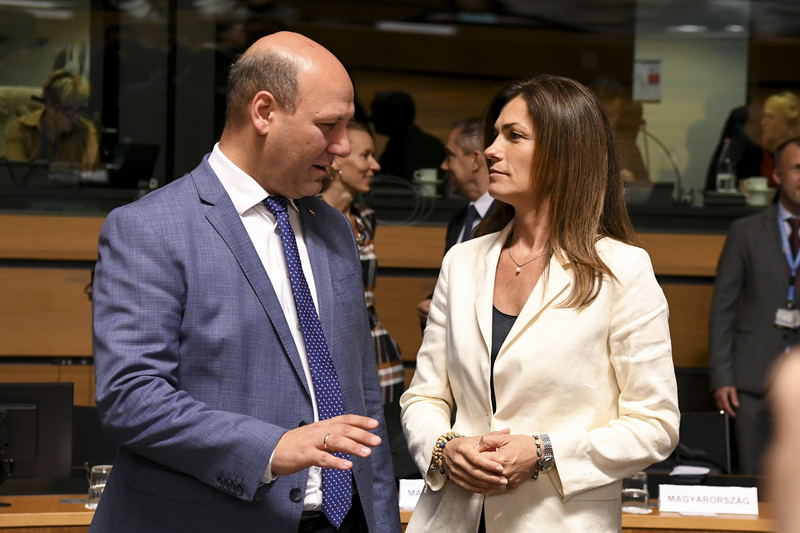
Another central element of the programme is the future of cohesion, she said, with Hungary's ambition to focus on the principle of upward convergence.
"It is very important to keep the catching-up of less developed countries with the developed ones as a guiding principle," he stressed. Judit Varga said that Hungary is in constant cooperation with its partners, the General Secretariat of the Council of the Governments of the EU Member States, with whom it is analysing its professional preparations.
She added that next year will be a special occasion when Hungary takes over the presidency, because it will be held by a government that has been in power since 2010.
"This means a special political and governmental stability and continuity," the justice minister said.
